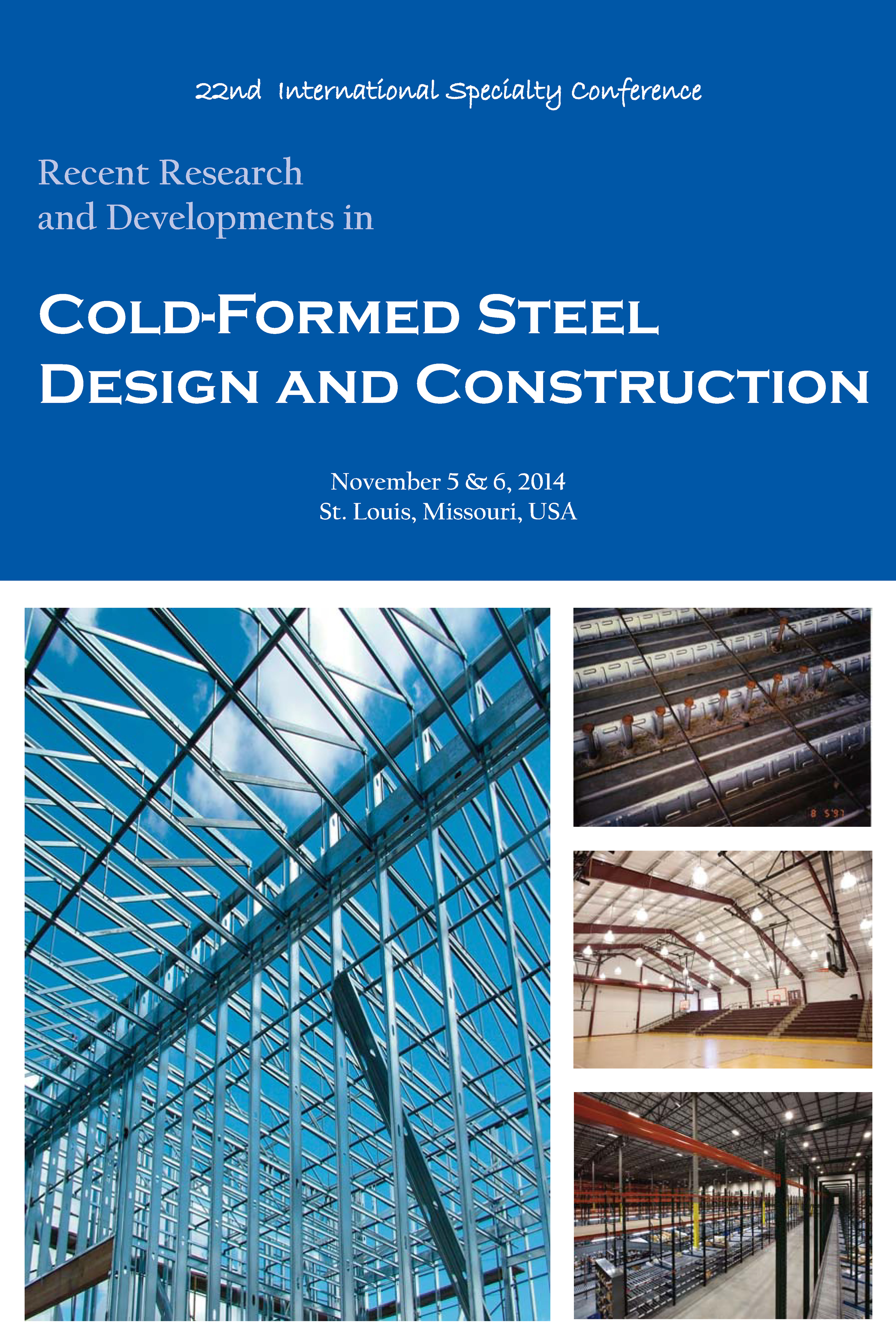Session Dates
05 Nov 2014
Abstract
This paper reports the results of a numerical (ABAQUS shell finite element analysis) investigation on the influence of local-distortional (L-D) interaction in the ultimate strength and design of cold-formed steel fixed-ended web-stiffened lipped channel columns -- hereafter termed “WSLC columns”. These results concern columns with various geometries and yield stresses, ensuring a wide variety of combined ratios between (i) the distortional and local critical buckling stresses, and (ii) the yield and the higher of the above buckling stresses. The objectives of this work are two-fold: (i) to acquire in-depth understanding on the mechanics underlying the L-D interaction in the WSLC columns analyzed, all selected to ensure that local buckling is triggered by the flanges, and also (ii) to provide a first contribution towards the efficient Direct Strength Method (DSM) design of these structural elements. The results presented and discussed concern the (i) post-buckling behavior (elastic and elastic-plastic), (ii) ultimate strength and (iii) failure mechanisms of the WSLC columns previously selected to undergo L-D interaction. Special attention is paid to comparing the ultimate strength erosions, due to L-D interaction, exhibited by the WSLC columns investigated here and the “plain cross-section” (i.e., without intermediate stiffeners) columns studied earlier by the authors (Martins et al. 2014a). Finally, the paper closes with some considerations about the impact of the findings reported in this work on the design of cold-formed steel columns undergoing different levels of L-D interaction.
Department(s)
Civil, Architectural and Environmental Engineering
Research Center/Lab(s)
Wei-Wen Yu Center for Cold-Formed Steel Structures
Sponsor(s)
Fundação para a Ciência e Tecnologia
Meeting Name
22nd International Specialty Conference on Cold-Formed Steel Structures
Publisher
Missouri University of Science and Technology
Document Version
Final Version
Rights
© 2014 Missouri University of Science and Technology, All rights reserved.
Document Type
Article - Conference proceedings
File Type
text
Language
English
Recommended Citation
Martins, André D.; Dinis, Pedro Borges; Camotim, Dinar; and Providência, Paulo, "On the Influence of Local-Distortional Interaction in the Behavior and Design of Cold-Formed Steel Web-Stiffened Lipped Channel Columns" (2014). CCFSS Proceedings of International Specialty Conference on Cold-Formed Steel Structures (1971 - 2018). 5.
https://scholarsmine.mst.edu/isccss/22iccfss/session02/5
On the Influence of Local-Distortional Interaction in the Behavior and Design of Cold-Formed Steel Web-Stiffened Lipped Channel Columns
This paper reports the results of a numerical (ABAQUS shell finite element analysis) investigation on the influence of local-distortional (L-D) interaction in the ultimate strength and design of cold-formed steel fixed-ended web-stiffened lipped channel columns -- hereafter termed “WSLC columns”. These results concern columns with various geometries and yield stresses, ensuring a wide variety of combined ratios between (i) the distortional and local critical buckling stresses, and (ii) the yield and the higher of the above buckling stresses. The objectives of this work are two-fold: (i) to acquire in-depth understanding on the mechanics underlying the L-D interaction in the WSLC columns analyzed, all selected to ensure that local buckling is triggered by the flanges, and also (ii) to provide a first contribution towards the efficient Direct Strength Method (DSM) design of these structural elements. The results presented and discussed concern the (i) post-buckling behavior (elastic and elastic-plastic), (ii) ultimate strength and (iii) failure mechanisms of the WSLC columns previously selected to undergo L-D interaction. Special attention is paid to comparing the ultimate strength erosions, due to L-D interaction, exhibited by the WSLC columns investigated here and the “plain cross-section” (i.e., without intermediate stiffeners) columns studied earlier by the authors (Martins et al. 2014a). Finally, the paper closes with some considerations about the impact of the findings reported in this work on the design of cold-formed steel columns undergoing different levels of L-D interaction.



